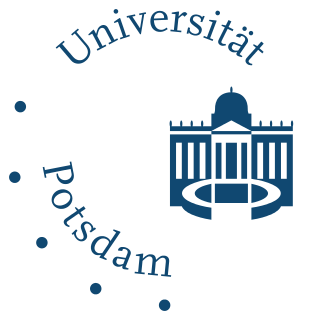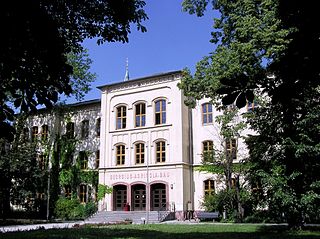A Fachhochschule, abbreviated FH is a university of applied sciences (UAS), in other words a German tertiary education institution that provides professional education in many applied sciences and applied arts, such as engineering, technology, business, architecture, design, and industrial design.

The College of Architecture, Art, and Planning (AAP) at Cornell University is one of the world's most highly regarded and prestigious schools of architecture and has the only department in the Ivy League that offers the Bachelor of Architecture degree. According to DesignIntelligence, Cornell architecture students are the most desired recent graduates by architecture firms, especially in New York City. The department has one of the largest endowments of any architecture program, including a $20 million endowment by Cayuga County resident Ruth Price Thomas in 2002. The Master of Regional Planning (M.R.P.) professional degree program at AAP has been consistently ranked in the top 10 in the nation, according to Planetizen's Guide to Graduate Urban Planning Programs.

The Bauhaus-Universität Weimar is a university located in Weimar, Germany, and specializes in the artistic and technical fields. Established in 1860 as the Great Ducal Saxon Art School, it gained collegiate status on 3 June 1910. In 1919 the school was renamed Bauhaus by its new director Walter Gropius and it received its present name in 1996. There are more than 4000 students enrolled, with the percentage of international students above the national average at around 27%. In 2010 the Bauhaus-Universität Weimar commemorated its 150th anniversary as an art school and college in Weimar.

The University of Potsdam is a public university in Potsdam, capital of the state of Brandenburg, Germany. It is mainly situated across three campuses in the city. Some faculty buildings are part of the New Palace of Sanssouci which is known for its UNESCO World Heritage status.

The Hamburg University of Applied Sciences is a higher education and applied research institution located in Hamburg, Germany. Formerly known as Fachhochschule Hamburg, the Hamburg University of Applied Sciences was founded in 1970. In terms of student enrolment, the HAW is the second-largest university in Hamburg and the forth-largest applied sciences university in Germany, with a student body of 16.879.

The Karlsruhe University of Applied Sciences is a university of applied sciences in Karlsruhe. It is the largest university of applied sciences in the state of Baden-Württemberg, offering both academic and professional higher education study programmes in engineering sciences, natural sciences, and business. Given the concentration of research centers and universities in and around Karlsruhe, the university of technology offers a wide range of courses on campus respected in the industry and academia.

The Frankfurt University of Applied Sciences is a public University of Applied Sciences in Frankfurt am Main, Germany.

The Hasso Plattner Institute(Hasso-Plattner-Institut für Digital Engineering gGmbH), abbreviated HPI, is a German information technology institute and faculty of the University of Potsdam located in Potsdam near Berlin. The teaching and research of HPI are focused on "IT-Systems Engineering". HPI was founded in 1998 and is the first, and as of 2018 the only entirely privately funded faculty in Germany. It is financed entirely through private funds donated by billionaire Hasso Plattner, who co-founded the software company SAP SE, and is currently the chairman of SAP's supervisory board. In addition to Christoph Meinel and Marcus Kölling the managment of HPI was expanded to include Ralf Herbrich and Tobias Friedrich on 1. November 2022.
The FH Aachen – Aachen University of Applied Sciences is one of the biggest Fachhochschulen in Germany with roughly 15,000 students, 250 professors, 470 contract lecturers, and 340 assistants. It is specialized in certain topical areas.
The Mainz University of Applied Sciences, is a 1971-founded university located in Mainz, Germany. The University of Applied Sciences Mainz consists of three faculties: School of Technology, School of Design and School of Business. The common feature of all fields of study is the practical orientation of the university, the short periods of study and the internationally orientated courses. In 2009 the School of Business, the School of Engineering with the departments Geoinformatics and Surveying and the administration of the university moved to the new location "Campus". All other departments will move as well in the near future to the new location "Campus".
Koblenz University of Applied Sciences is a public university in Rhineland-Palatinate. Although the present university was established in 1996, it has a rich tradition in higher education. The roots of today's Faculty of Materials Engineering, Glass and Ceramics in Hoehr‑Grenzhausen, come down to the 19th century.

The Technical University of Applied Sciences Würzburg-Schweinfurt is a technical university in Germany, which was founded originally in 1807, and was restructured during 1971. The university is among the best applied sciences universities in Germany with over 150 partner universities worldwide. The university is located in Bavaria with campuses in Würzburg and Schweinfurt.
Osnabrück University of Applied Sciences is a university of applied science in Lower Saxony, whose administrative centre is in Osnabrück. It has existed in its current form since 2003, having originally opened in 1971. Some of its departments can be traced back to engineering schools and other colleges operating as early as the 1950s.

The Westsächsische Hochschule Zwickau - University of Applied Sciences Zwickau is a vocational university of about 3300 students located in Zwickau. Saxony, Germany. It offers Bachelor's, Master's and traditional German Diplom degrees in four core areas: Technology, Economics, Arts, and Life Sciences. The university also has further campuses in Markneukirchen, Reichenbach im Vogtland and Schneeberg.

The Kiel University of Applied Sciences is a University of Applied Sciences, established in 1969. It is one of three public institutions of higher learning in Kiel, Germany. It provides around 30 Bachelor‘s and Master‘s degrees, supplementary degrees and continuing education courses by the faculties of Agriculture, Business Management, Computer Science & Electrical Engineering, Mechanical Engineering, Media and Social Work and Health. As of November 2018 there are 7824 students enrolled.

The Technische Hochschule Ostwestfalen-Lippe is a state tech university in the Ostwestfalen-Lippe area in Lemgo, which is part of North Rhine-Westphalia. Additional campuses are in Detmold and Höxter. About 6,600 students work closely with 173 professors and about 550 other staff members in research, teaching and administration.

Burg Giebichenstein Kunsthochschule Halle (BURG) is the university of art and design in Halle an der Saale that was established in 1915. With a student body numbering over 1,000, BURG is one of the largest universities of art and design in Germany. It offers 20 art and design degree programmes in two faculties.
FH Münster, based in the Westphalian city of Münster with a second campus in Steinfurt, is a German university. It has a student enrolment of around 15,000, making it one of the largest public universities of applied sciences in Germany. It has twelve faculties and one central scientific unit.












